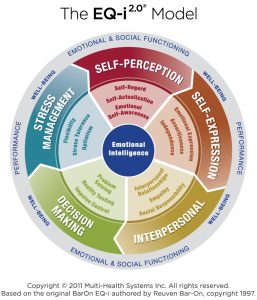Assessments & Certifications
Marshall Goldsmiths statement, ‘what got you here, won’t get your there’ reminds leaders of the need for ongoing assessment and honest feedback in order to continuously improve and lead effectively.
Emotional Intelligence: EQ-i 2.0
Emotional resilience is about processing emotions more effectively from a place of deep self-awareness, intentionality and purpose.
Emotional Intelligence is a set of emotional and social skills that influence the way we perceive and express ourselves, develop and maintain social relationships, cope with challenges and use emotional information in an effective and meaningful way.
The EQ-i 2.0 is the world’s leading assessment tool used for assessing emotional and social intelligence and an excellent way to understand the emotional competencies of an individual. It provides you with a picture of how you operate emotionally, your areas of strength and potential areas for development.
The assessment tool is delivered online, using a secure site and involves responding to 133 statements, taking approximately twenty minutes to complete. Once completed, there are two report types to choose from: the Workplace Report and the Leadership Report, each providing scores in 15 competencies, grouped into five composite areas:

- Self-Perception
- Self-Expression
- Interpersonal
- Decision Making
- Stress Management
A multi-rater EQ 360 is also available. While the EQ-i 2.0 identifies the level of a client’s emotional and social functioning based on his or her responses, the EQ 360 assessment provides a more in-depth analysis by having those who work with the client provide information as well. When observer ratings are compared with the results of an EQ-i 2.0 self-report, a more complete 360 degree profile emerges.
Power Intelligence: Diamond Power Index (DPI)
“How leaders use their power and whether they can effectively manage the authority of their role is one of the most critical factors in the success of an organization” (Julie Diamond). The realities of chaos in todays world calls for a healthy use of power for courageous leadership.
When power is used effectively
- Engagement increases because leaders know how to create conditions for people to do meaningful work.
- There’s more psychological safety – people feel safe to speak up, ask great questions, and contribute their ideas freely.
- The workplace becomes more inclusive, respectful, and fair for all.
If your work is to help leaders and their organizations thrive, it’s vital you understand how their use of power impacts culture.
The DPI is a multi-rater 360 assessment that measure the following leadership competencies:
- Accessible
- Empowering
- Conscientious
- Respectful
- Professional
- Fair
- Decisive
Optimize your leadership by targeting critical opportunities and vulnerabilities related to how you use your power – personally and professionally. Using power effectively is a learnable competency.
Strengths Quest (for university & college students)
Strengths Quest is designed to help students identify and leverage their strengths.
Using the Clifton Strengths assessment, students transform the way they experience college and university, to achieve success in academics, career and life. Students learn to be more engaged, and thrive while on campus, and beyond.
People Styles Assessment: for leadership and working with teams
We all have a preferred style of working and leading. Leverage the power and effective use of people styles at work … and beyond, based on a model of four leadership styles developed by Bolton & Bolton in People Styles at Work (1996).
Focused on behaviour rather than personality, the People Styles Assessment is based on other people’s perceptions of you, not on how you see yourself. The people styles include: Analytical, Driver, Amiable, and Expressive, measuring the degree of assertiveness and responsiveness.
Leverage your strengths and values of your style and others, especially if you work in teams. Once you know your style, learn how to flex to other styles for effective teams.
OTHER TOOLS
Neuroscience, Consciousness & Transformation Coaching
My coaching is driven by the latest research in the neuroscience of human development, consciousness and effectiveness. I provide tools and a road map to better understand the brain and executive functions, change, learning and stress management and resilience.
Reveal what gets in your way of success. Identify your inner critics, saboteurs and triggers. Apply the Seven Levels of Effectiveness™ and other neuroscience tools to better understand what’s happening in your brain and body under different circumstances.
ORSC (Organization Relationship and Systems Coaching)
Coaching & facilitation of 2 or more people.
Based on Relationship Systems Intelligence™ (RSI), ORSC is an advanced and courageous way of approaching leadership and team interactions. The basic principle of RSI is the redirection of focus from the individuals within the system, to the whole system as an entity in itself. In comparison to Emotional Intelligence (knowing me) and Social Intelligence (knowing you and me), RSI focuses on the relationship entity that exists among the humans in that system (knowing “it” or the relationship itself). This RSI principle moves leaders from working with aggregates of individuals to a holistic systems approach, increasing Collective Intelligence, and enhancing overall team performance.
Deep Democracy
Bringing our deepest selves to conflict and disagreements.
Groups and individuals get stuck in their development and need new information to break through unproductive patterns to organize at higher levels of awareness. The principles of Deep Democracy help us learn more about ourselves, and others by valuing all voices, especially the unpopular and hidden ones as change happens from the margins.
